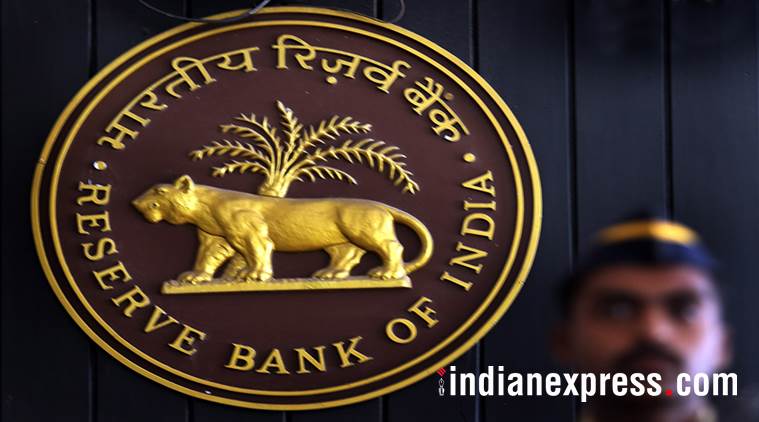RBI likely to keep policy rates unchanged for now
Higher minimum support price, fiscal slippages may force rate hike later
 (Express Photo by Pradip Das)
(Express Photo by Pradip Das)
The Reserve Bank of India (RBI) is expected to remain on pause mode with a hawkish outlook in the near term at its upcoming policy review on February 7, but may raise rates later given the risks of higher inflation with fiscal slippages and higher food prices with the government planning to increase the Minimum Support Price (MSP).
While banks and bond markets have already signalled the end of the interest rate easing cycle, the RBI’s Monetary Policy Committee, which meets on February 6-7, is expected to keep key policy rates unchanged. But the RBI is likely to flag both these factors — risk of higher MSP and slower fiscal consolidation — as a medium-term risk to inflation, said analysts. The government has said that the fiscal deficit in 2017-18 will be 3.5 per cent, higher than the budgeted 3.2 per cent at the start of this fiscal, which is seen as a negative by the bond and equity markets, and already reflected in higher yields and falling stock prices in the wake of the Budget.
“We expect the RBI to remain on pause in this policy. However, the tone will likely be more hawkish, with probability of rate hikes in FY 2019 increasing,” said Suvodeep Rakshit, senior economist, Kotak Institutional Equities. While the RBI’s primary concern will be the rising inflation trajectory, the February policy meeting will also assess the implications of the Union Budget. Even as the RBI takes note of fiscal consolidation and expenditure on roads and railways, it will be cautious on risks of revenue slippages, increase in food subsidy (possibly through higher MSP), overall expenditure quality and possible fiscal slippages. Further, higher crude prices and global macro conditions will weigh on the RBI’s decision, he said.
Crude oil prices have already touched $70 per barrel, bond yields are rising globally and stock markets are now skittish. Banks, led by State Bank of India, have already raised bulk deposit rates by up to 140 basis points. “If the MSP increases are much larger, they could feed into higher inflation and increase the chances of a tighter monetary policy. We will closely watch the decision on MSP to assess the impact on our inflation and monetary policy outlook. For now, we expect a prolonged pause on monetary policy including at the upcoming February 7 policy meeting, although the RBI may flag upside risks to inflation,” Nomura group said in a note.
At a time when macro trends are weakening — high oil prices, rising inflation, increasing current account deficit — markets would have expected more fiscal prudence and commitment to the 3 per cent fiscal target. That has not come through and has left the bond markets disappointed. The deficit numbers unnerved the bond market with the yield on 10-year benchmark government security (old) rising by 20 basis points to 7.80 per cent and the 10-year benchmark security (new) climbing 17 basis points to 7.60 per cent on Budget day.

“The expected MSP increase of the order of around 8-10 per cent should lead to CPI inflation to average around 5.5 per cent which could force the RBI to potentially hike the Repo rate this year to bring inflation within its 4 per cent target. The bond markets will expect a hawkish RBI in its policy meet,” said Pankaj Pathak, fund manager, Quantum AMC.
According to Care Ratings, a rate cut by RBI can be ruled out and, based on the trajectory in the next few months, a rate hike could be the next rate action. But it would be status quo in February. Retail inflation rose to 5.2 per cent in December. It is clear that the direction of inflation will be northwards as all segments are witnessing higher inflation rates of above 4 per cent. The impact of HRA was getting more pronounced in the last two months and was 8.3 per cent. Fuel prices too have gone up by 7.9 per cent and, with higher crude oil prices, guidance from the Budget would be important, it said.
On the other hand, possibility of higher inflation and a surge in bond yields in the US have created jitters on Wall Street and other global markets.
In the December policy review, the six-member MPC of the central bank kept the main policy rate — Repo rate, or the rate at which it lends funds to banks — unchanged at 6 per cent and reverse repo rate at 5.75 per cent. However, the decision was not unanimous as five members — Chetan Ghate, Pami Dua, Michael Debabrata Patra, Viral V Acharya and Urjit R Patel — were in favour of keeping the Repo rate steady, while Ravindra H Dholakia voted for a policy rate reduction of 25 basis points. The RBI last cut the repo rate by 25 basis points to 6 per cent in the August 2017 review.
The RBI had, in December, warned that implementation of farm loan waivers by select states, partial rollback of excise duty and VAT in the case of petroleum products, and decrease in revenue on account of reduction in GST rates for several goods and services may result in fiscal slippage with attendant implications for inflation.
Photos


- 01
- 02
- 03
- 04
- 05





























